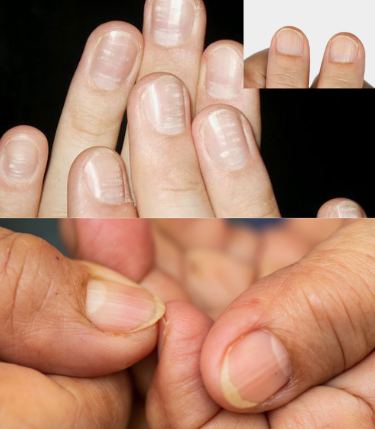
The Hidden Language of Nail Health
Most of us notice our nails only when they’re freshly polished or frustratingly chipped. But did you know your nails can actually tell a story about your overall health? When nails start splitting, breaking, or showing unusual patterns, it’s often more than just a cosmetic issue. These changes can serve as early warning signs of nutritional deficiencies, lifestyle habits, or even underlying health conditions. Understanding what your nails are trying to communicate is like learning a new language—one that could help you catch problems before they escalate.
Nutritional Deficiencies That Affect Nail Strength
Diet plays a massive role in nail health, and when your body lacks certain nutrients, your nails are often the first to reveal it.
- Biotin Deficiency
Biotin, part of the B-vitamin family, is essential for strong nails, healthy skin, and shiny hair. Without enough biotin, nails become brittle and prone to cracking. Good sources include eggs, almonds, cauliflower, mushrooms, and spinach. Adding these to your diet can make a noticeable difference. - Iron Deficiency
Ever noticed oddly shaped, spoon-like nails? This could be a sign of low iron levels. Iron is key for transporting oxygen to nail cells, fueling their growth and strength. Foods like lentils, spinach, fortified cereals, and lean red meat can restore balance. - Low Protein Intake
Nails are built from keratin, a protein. Skimping on protein makes your nail structure weaker, leading to more breakage. Incorporate fish, poultry, legumes, and dairy to strengthen nails naturally.
The Role of Hydration in Nail Health
Just like skin, nails need water to stay flexible. When you’re dehydrated, nails dry out and lose elasticity, making them snap more easily. Drinking enough water throughout the day doesn’t just keep your body functioning properly—it also helps your nails stay smooth, strong, and less likely to peel.
Video : Why Your Nails Are Weak, Brittle, or Peeling | Nail Health Tips
Environmental Factors That Damage Nails
Sometimes it’s not about what’s going on inside but what your nails are exposed to on the outside.
- Chemical Exposure
Cleaning products, detergents, and nail polish removers (especially those with acetone) can strip natural oils and weaken nails. A simple fix? Wear protective gloves when cleaning and choose acetone-free removers. - Weather Extremes
Cold, dry air robs nails of moisture, while constant exposure to water can make them soft and fragile. Regular moisturizing and wearing gloves in winter help protect against environmental wear and tear.
Underlying Health Conditions You Shouldn’t Ignore
Persistent nail problems may indicate something more serious.
- Thyroid Disorders
Both an overactive and underactive thyroid can interfere with nail growth, leaving them brittle. If you notice other symptoms—like fatigue or weight changes—it may be worth asking your doctor for a thyroid test. - Psoriasis
This chronic skin condition can extend to nails, causing pitting, discoloration, and separation from the nail bed. Proper treatment of psoriasis often improves nail health. - Fungal Infections
Thickened, brittle, or yellowing nails often point to fungal infections. These require antifungal treatments to restore healthy nails and prevent spreading.
Physical Stress and Nail Trauma
We’re all guilty of using our nails as makeshift tools—prying open packages, scratching labels, or tapping on hard surfaces. Unfortunately, this physical stress can lead to cracks and long-term damage. Keeping nails trimmed, filing them gently, and resisting the urge to use them as “tools” can prevent unnecessary breakage.
How Aging Impacts Nail Health
Just like skin and hair, nails change with age. As you get older, nails may become drier and more brittle due to slower circulation and reduced natural oil production. The solution? Load up on omega-3 fatty acids from foods like salmon, flaxseeds, and walnuts. Pair this with regular moisturizing to keep nails resilient even as the years go by.
Practical Tips for Stronger, Healthier Nails
- Eat a balanced diet rich in protein, iron, and vitamins.
- Stay hydrated—water is your nail’s best friend.
- Use gloves when handling chemicals or washing dishes.
- Moisturize nails and cuticles daily.
- Keep nails trimmed, filed, and avoid biting or picking.
Video : 10 Nail Symptoms and What They Mean for Your Health You Shouldn’t Ignore
Conclusion: Your Nails as a Health Barometer
Nails are more than just an aesthetic feature—they’re mini health indicators. From nutritional deficiencies and hydration habits to environmental stress and medical conditions, your nails reflect what’s happening inside and outside your body. By paying attention to these subtle signals, you can not only improve the look and strength of your nails but also support your overall well-being. If problems persist despite lifestyle changes, consulting a healthcare professional is the next smart step. After all, strong nails are often a sign of a strong, healthy body.


